Charles E W Bean, Diaries, AWM38 3DRL 606/254/1 - 1917 - 1933 - Part 14
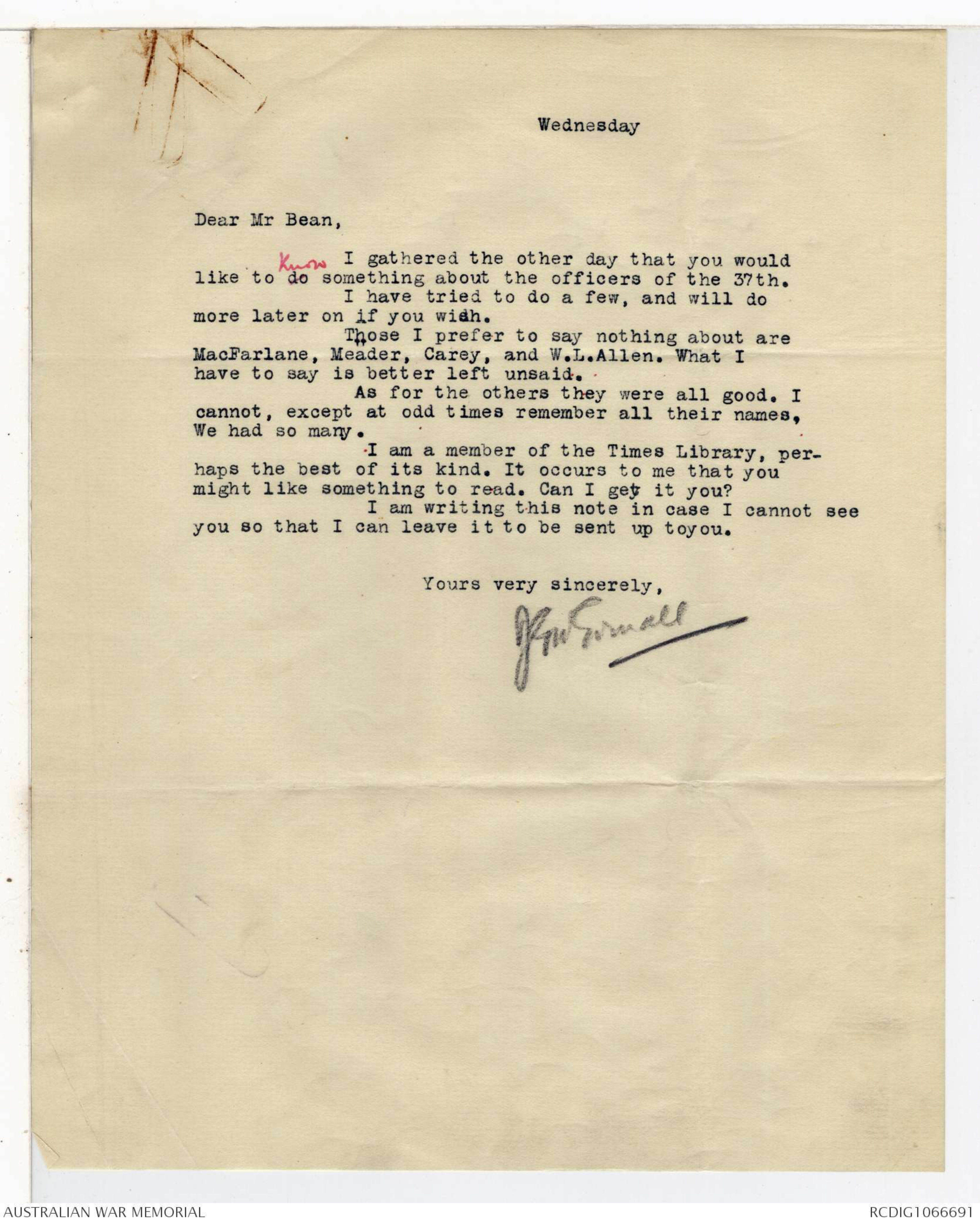
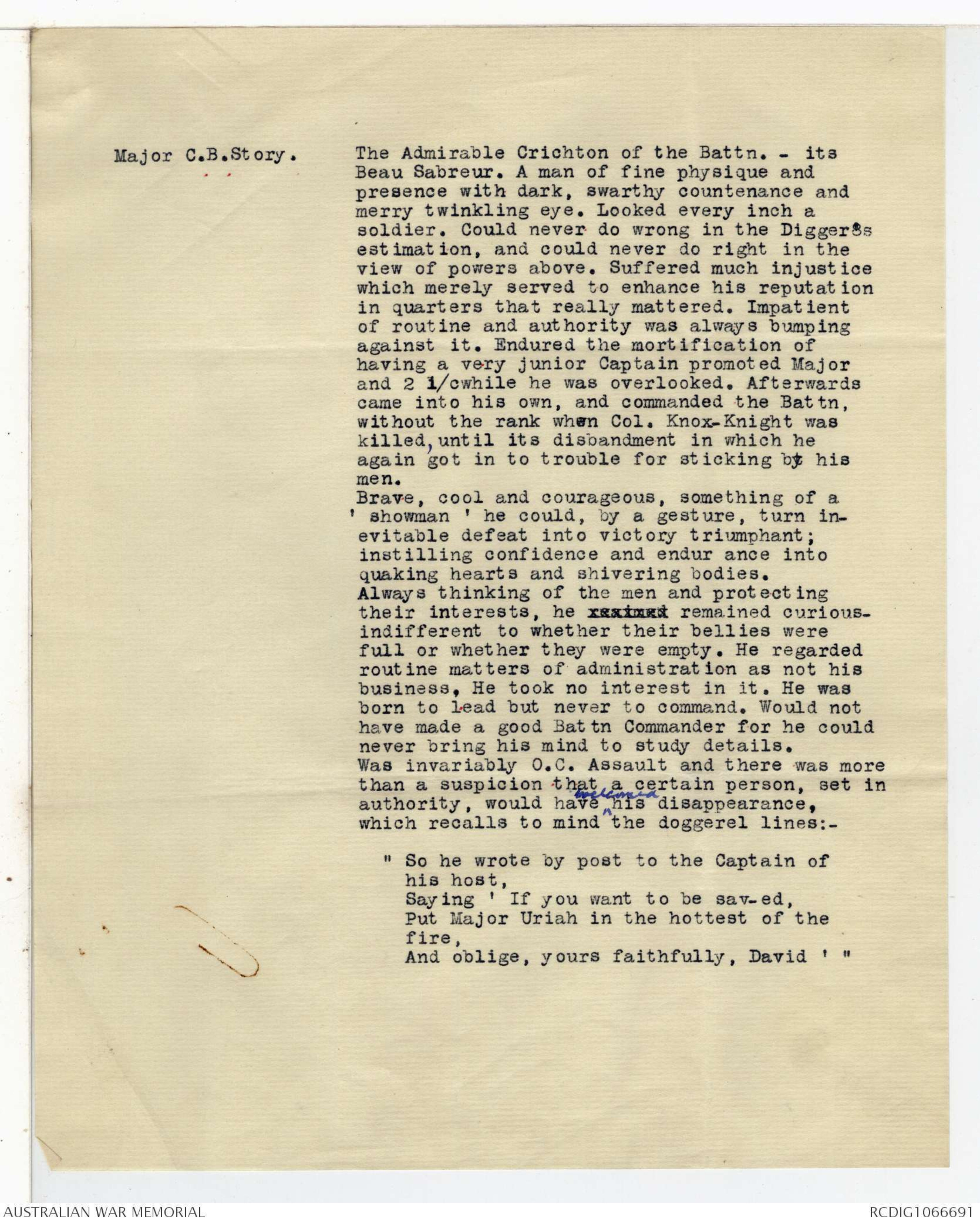
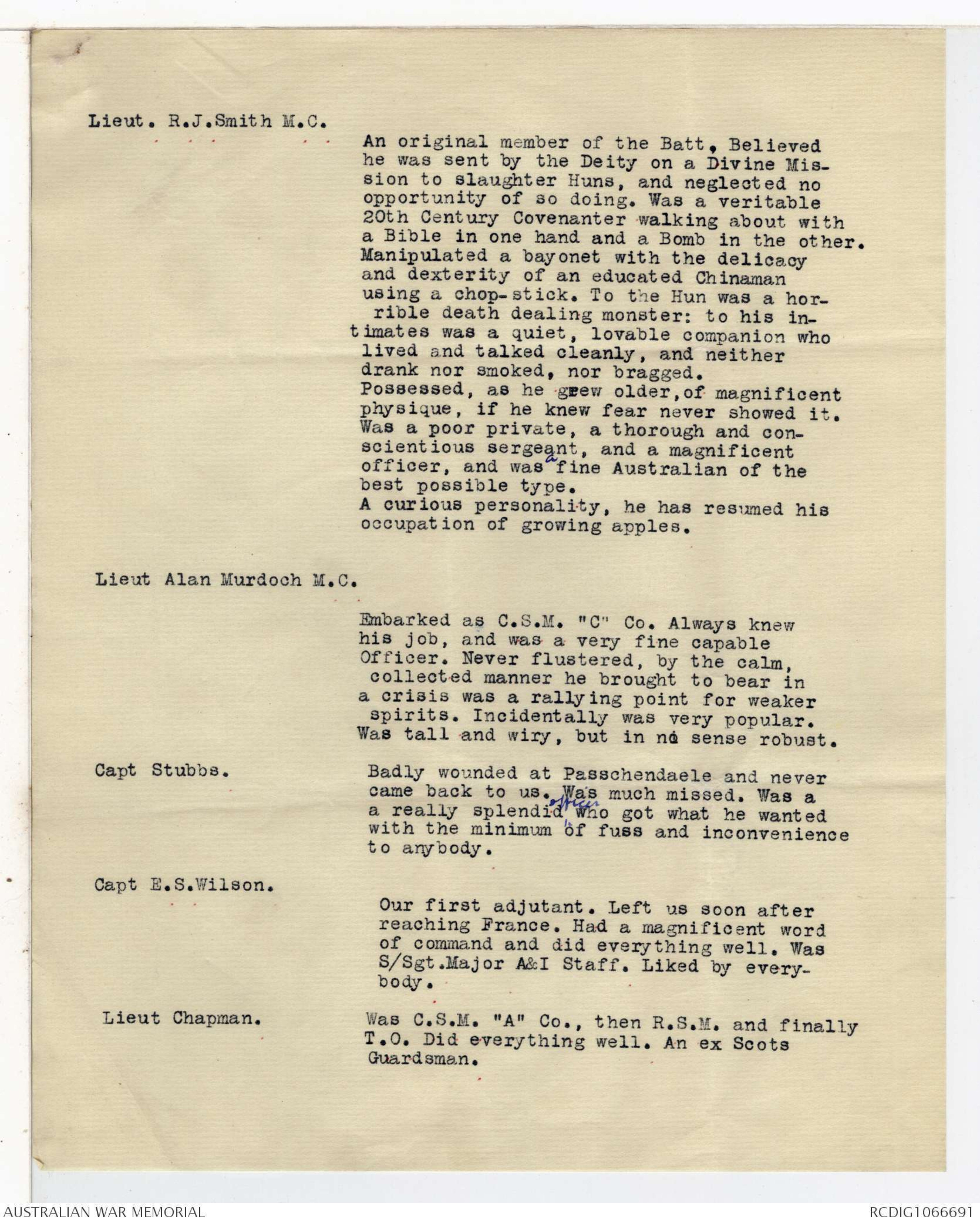
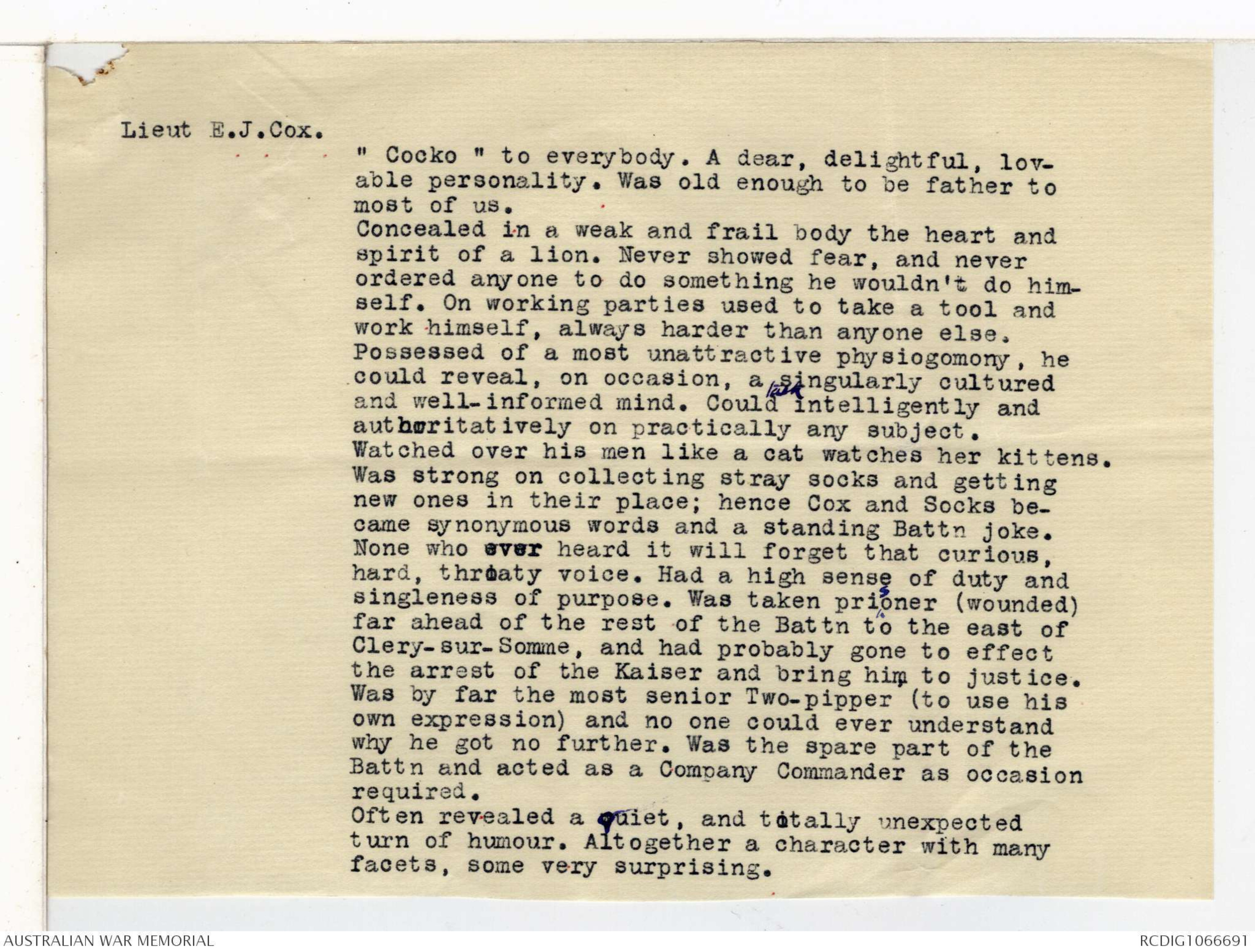
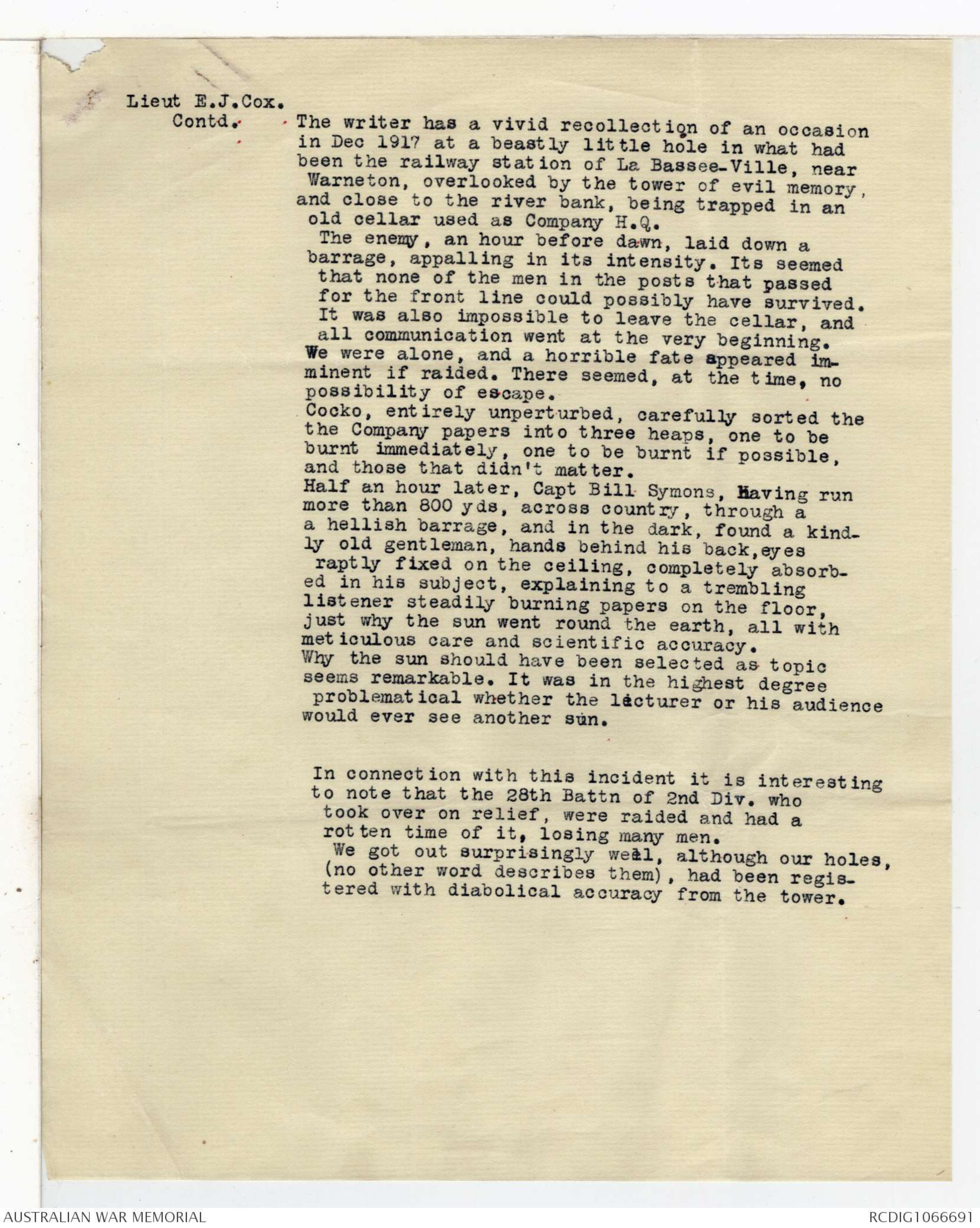
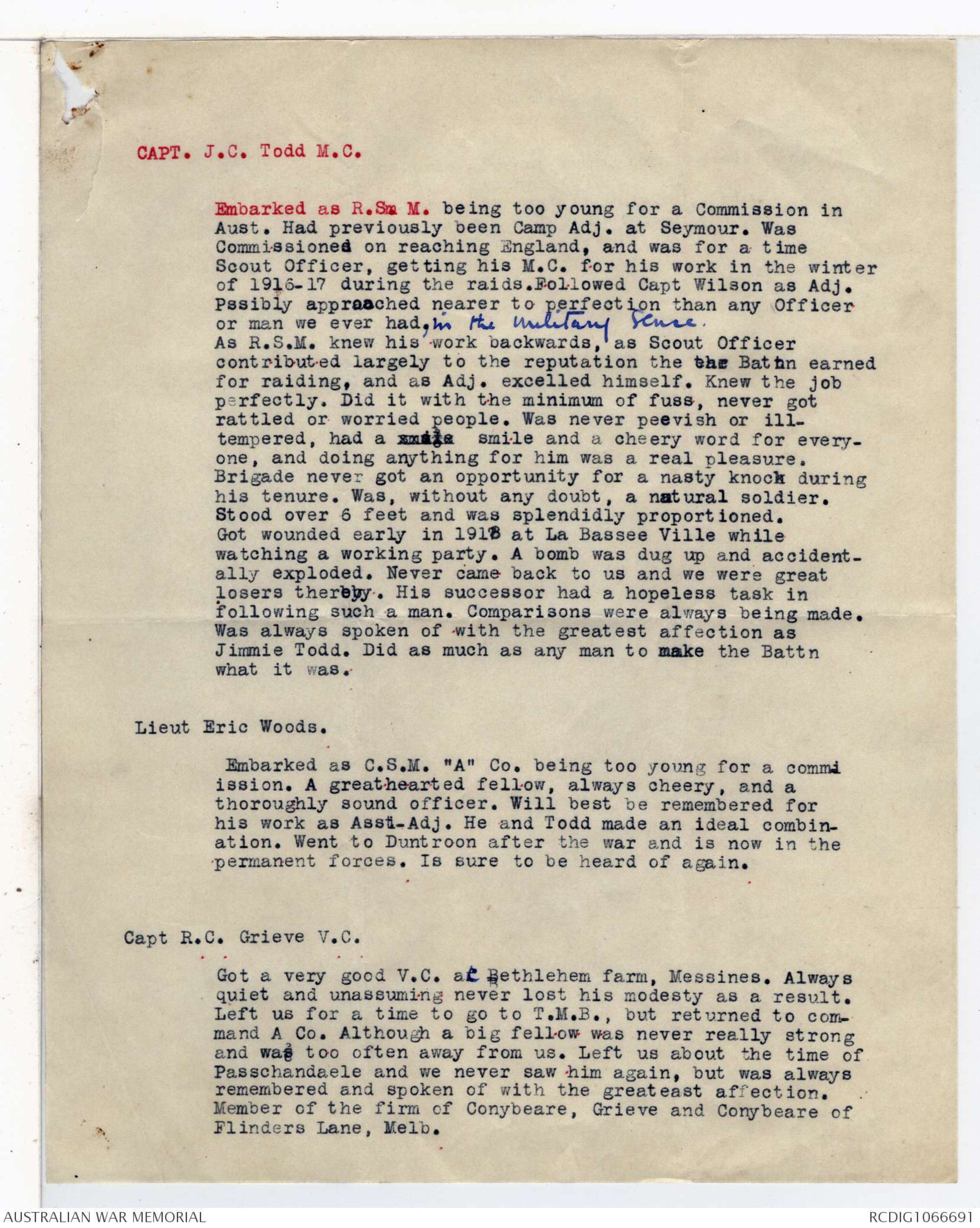
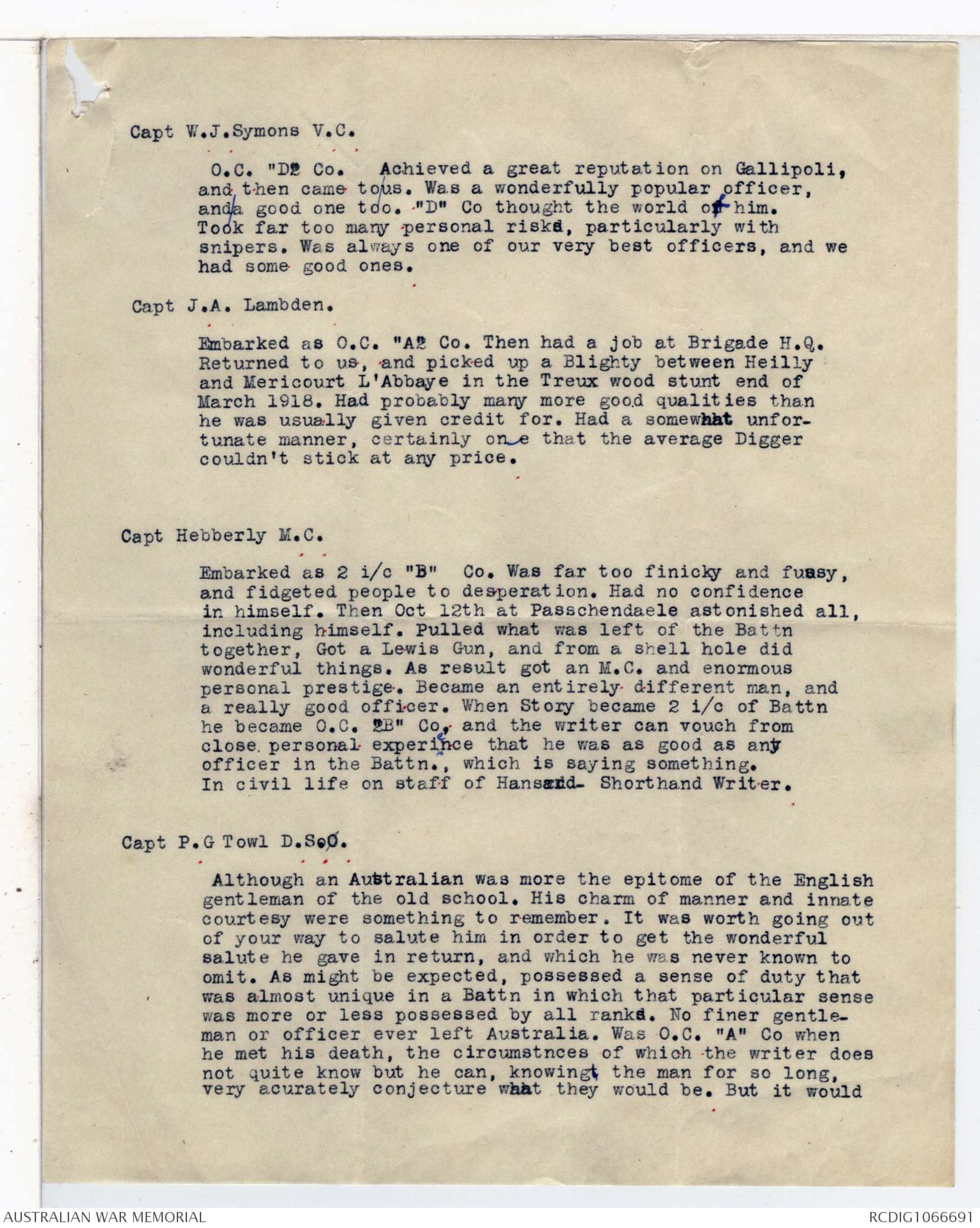
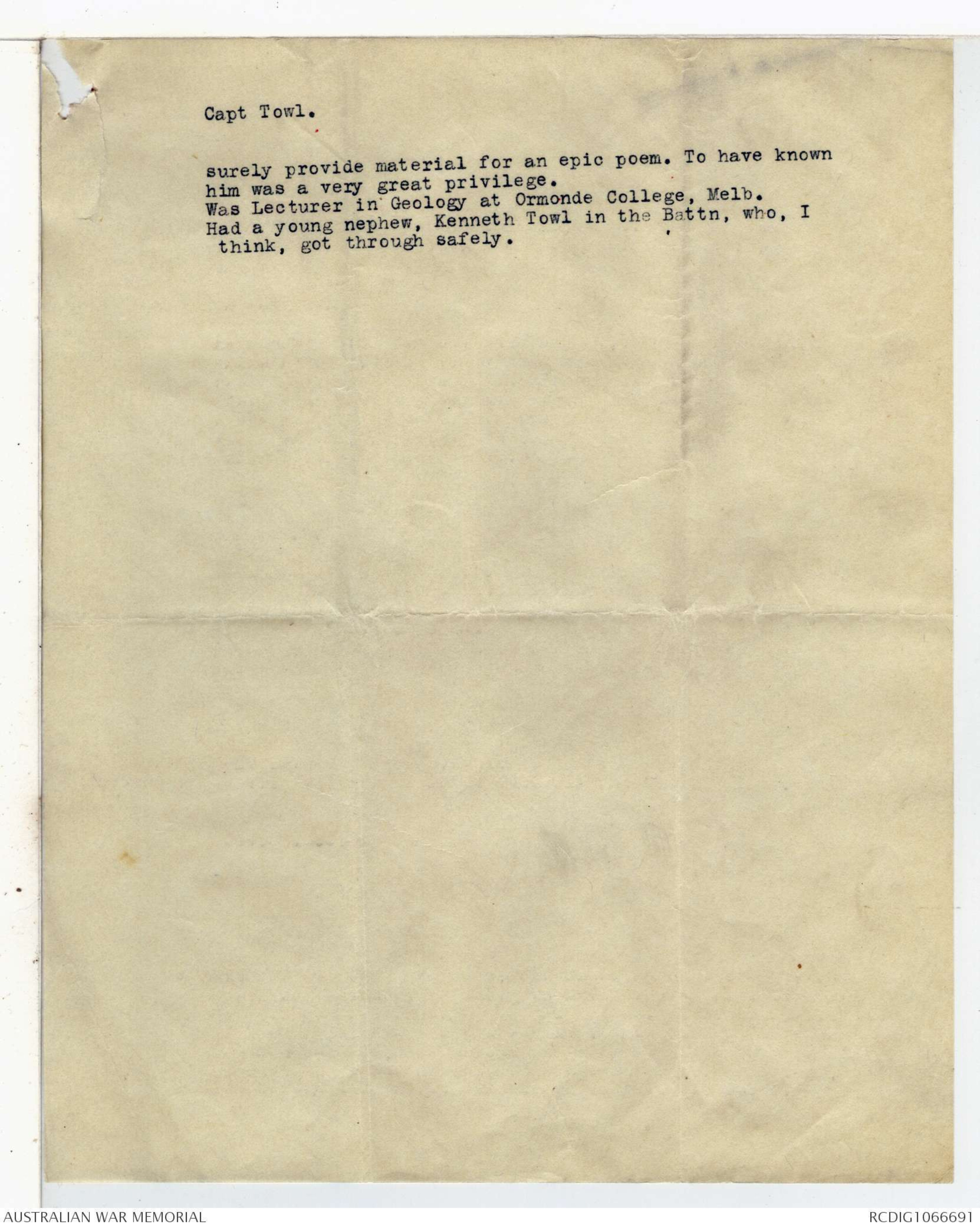
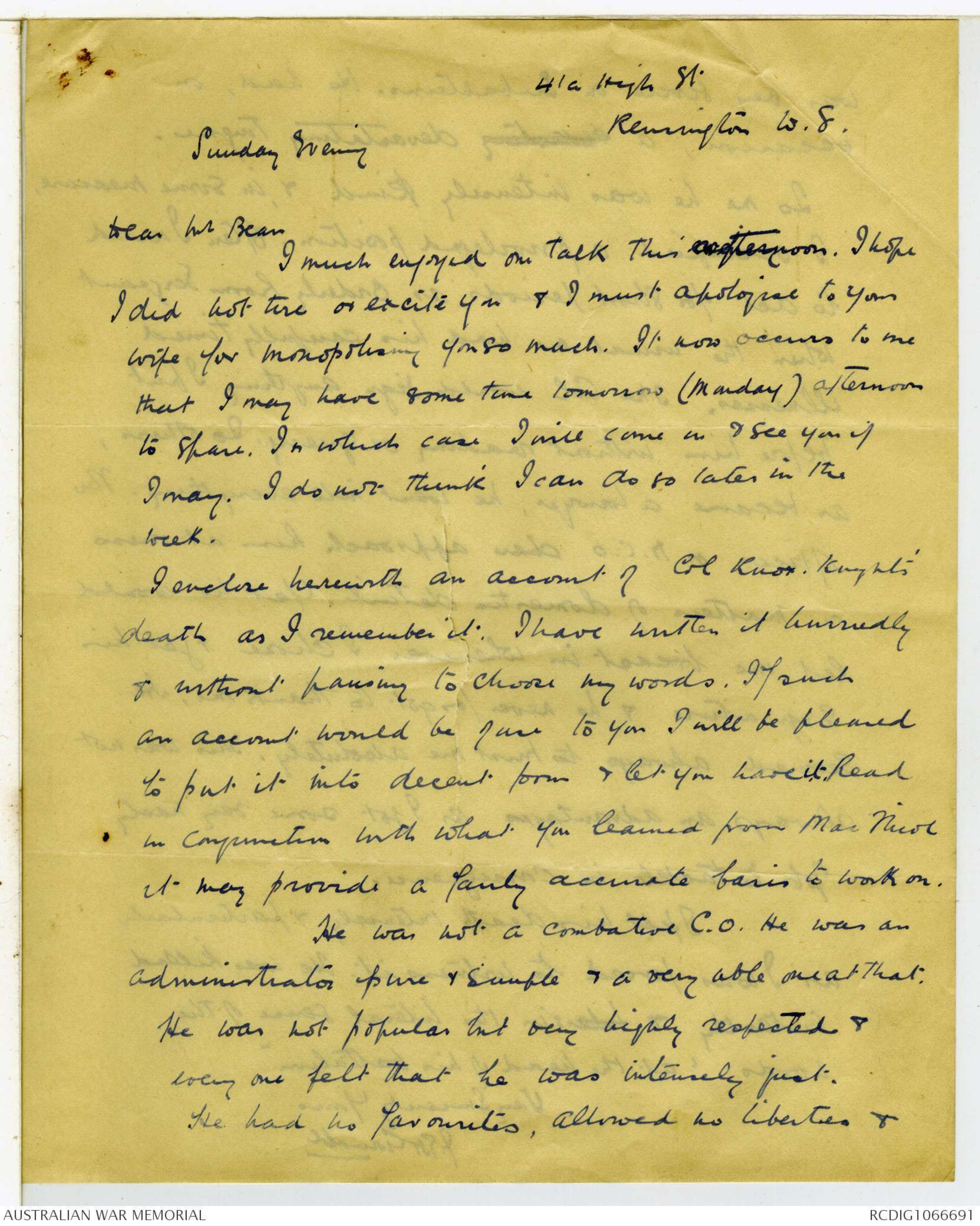
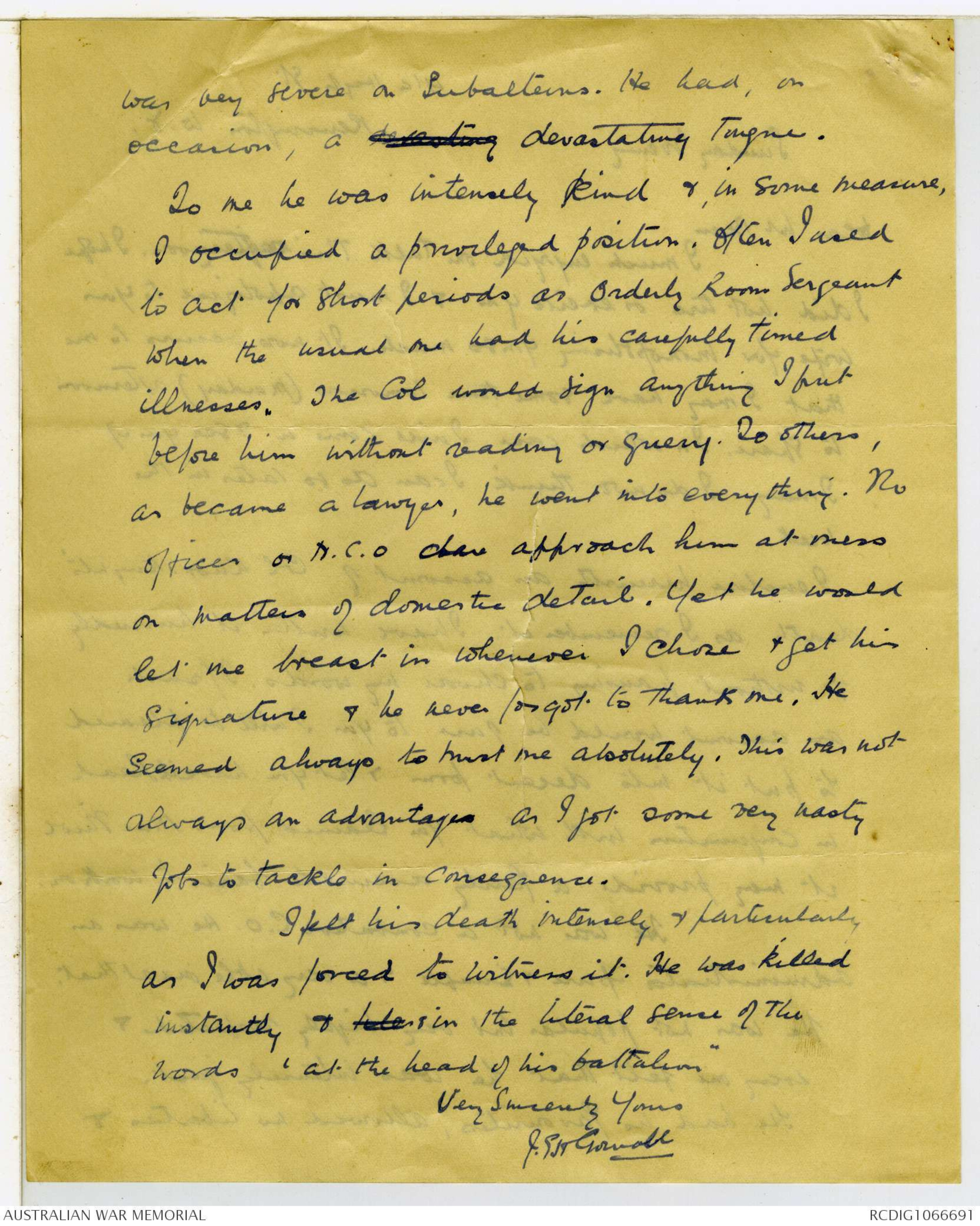
Wednesday
Dear Mr Bean,
I gathered the other day that you would
like to do know something about the officers of the 37th.
I have tried to do a few, and will do
more later on if you wish.
Those I prefer to say nothing about are
MacFarlane, Meader, Carey, and W.L.Allen. What I
have to say is better left unsaid.
As for the others they were all good. I
cannot, except at odd times remember all their names,
We had so many.
I am a member of the Times Library, perhaps
the best of its kind. It occurs to me that you
might like something to read. Can I get it you?
I am writing this note in case I cannot see
you so that I can leave it to be sent up to you.
Yours very sincerely,
J G H Gornall
Major C.B.Story. The Admirable Crichton of the Battn. - its
Beau Sabreur. A man of fine physique and
presence with dark, swarthy countenance and
merry twinkling eye. Looked every inch a
soldier. Could never do wrong in the Digger's
estimation, and could never do right in the
view of powers above. Suffered much injustice
which merely served to enhance his reputation
in quarters that really mattered. Impatient
of routine and authority was always bumping
against it. Endured the mortification of
having a very junior Captain promoted Major
and 2 i/cwhile he was overlooked. Afterwards
came into his own, and commanded the Battn,
without the rank when Col. Knox-Knight was
killed, until its disbandment in which he
again got in to trouble for sticking by his
men.
Brave, cool and courageous, something of a
' showman ' he could, by a gesture, turn inevitable
defeat into victory triumphant;
instilling confidence and endur ance into
quaking hearts and shivering bodies.
Always thinking of the men and protecting
their interests, he xxxxxxx remained curious-
indifferent to whether their bellies were
full or whether they were empty. He regarded
routine matters of administration as not his
business, He took no interest in it. He was
born to lead but never to command. Would not
have made a good Bat tn Commander for he could
never bring his mind to study details.
Was invariably O.C. Assault and there was more
than a suspicion that, a certain person, set in
authority, would have ^ welcomed his disappearance,
which recalls to mind the doggerel lines:-
" So he wrote by post to the Captain of
his host,
Saying ' If you want to be sav-ed
Put Major Uriah in the hottest of the
fire,
And oblige, yours faithfully, David ' "
Lieut. R.J. Smith M.C.
An original member of the Batt, Believed
he was sent by the Deity on a Divine Mission
to slaughter Huns, and neglected no
opportunity of so doing. Was a veritable
20th Century Covenanter walking about with
a Bible in one hand and a Bomb in the other.
Manipulated a bayonet with the delicacy
and dexterity of an educated Chinaman
using a chop-stick. To the Hun was a horrible
death dealing monster: to his intimates
was a quiet, lovable companion who
lived and talked cleanly, and neither
drank nor smoked, nor bragged.
Possessed, as he grew older, of magnificent
physique, if he knew fear never showed it.
Was a poor private, a thorough and conscientious
sergeant, and magnificent
officer, and was a fine Australian of the
best possible type.
A curious personality, he has resumed his
occupation of growing apples.
Lieut Alan Murdoch M.C.
Embarked as C.S.M. "C". Co. Always knew
his job, and was a very fine capable
Officer. Never flustered, by the calm,
collected manner he brought to bear in
a crisis was a rallying point for weaker
spirits. Incidentally was very popular.
Was tall and wiry, but in no sense robust.
Capt Stubbs. Badly wounded at Passchendaele and never
came back to us. Was much missed. Was a
a really splendid ^ officer who got what he wanted
with the minimum of fuss and inconvenience
to anybody.
Capt E. S. Wilson.
Our first adjutant. Left us soon after
reaching France. Had a magnificent word
of command and did everything well. Was
S/Sgt.Major A&I Staff. Liked by everybody.
Lieut Chapman. Was C.S.M. "A" Co., then R.S.M. and finally
T.O. Did everything well. An ex Scots
Guardsman.
Lieut E.J. Cox.
" Cocko " to everybody. A dear, delightful, lovable
personality. Was old enough to be father to
most of us.
Concealed in a weak and frail body the heart and
spirit of a lion. Never showed fear, and never
ordered anyone to do something he wouldn't do himself.
On working parties used to take a tool and
work himself, always harder than anyone else.
Possessed of a most unattractive physiogomony, he
could reveal, on occasion, a singularly cultured
and well-informed mind. Could talk intelligently and
authoritatively on practically any subject.
Watched over his men like a cat watches her kittens.
Was strong on collecting stray socks and getting
new ones in their place; hence Cox and Socks became
synonymous words and a standing Battn joke.
None who ever heard it will forget that curious,
hard, throaty voice. Had a high sense of duty and
singleness of purpose. Was taken pri^soner (wounded)
far ahead of the rest of the Battn to the east of
Clery-sur-Somme, and had probably gone to effect
the arrest of the Kaiser and bring him to justice.
Was by far the most senior Two-pipper (to use his
own expression) and no one could ever understand
why he got no further. Was the spare part of the
Battn and acted as a Company Commander as occasion
required.
Often revealed a quiet, and totally unexpected
turn of humour. Altogether a character with many
facets, some very surprising.
Lieut E.J.Cox.
Contd. The writer has a vivid recollection of an occasion
in Dec 1917 at a beastly little hole in what had
been the railway station of La Bassee-Ville, near
Warneton, overlooked by the tower of evil memory,
and close to the river bank, being trapped in an
old cellar used as Company H.Q.
The enemy, an hour before dawn, laid down a
barrage, appalling in its intensity. Its seemed
that none of the men in the posts that passed
for the front line could possibly have survived.
It was also impossible to leave the cellar, and
all communication went at the very beginning.
We were alone, and a horrible fate appeared imminent
if raided. There seemed, at the time, no
possibility of escape.
Cocko, entirely unperturbed, carefully sorted the
the Company papers into three heaps, one to be
burnt immediately, one to be burnt if possible,
and those that didn't matter.
Half an hour later, Capt Bill Symons, having run
more than 800 yds, across country, through a
a hellish barrage, and in the dark, found a kindly
old gentleman, hands behind his back, eyes
raptly fixed on the ceiling, completely absorbed
in his subject, explaining to a trembling
listener steadily burning papers on the floor,
just why the sun went round the earth, all with
meticulous care and scientific accuracy.
Why the sun should have been selected as topic
seems remarkable. It was in the highest degree
problematical whether the lecturer or his audience
would ever see another sun.
In connection with this incident it is interesting
to note that the 28th Battn of 2nd Div. who
took over on relief, were raided and had a
rotten time of it, losing many men.
We got out surprisingly well, although our holes,
(no other word describes them), had been registered
with diabolical accuracy from the tower.
CAPT. J.C. Todd M.C.
Embarked as R.Sm.M. being too young for a Commission in
Aust. Had previously been Camp Adj. at Seymour. Was
Commissioned on reaching England, and was for a time
Scout Officer, getting his M.C. for his work in the winter
of 1916-17 during the raids. Followed Capt Wilson as Adj.
Pssibly approached nearer to perfection than any Officer
or man we ever had, in the military sense.
As R.S.M. knew his work backwards, as Scout Officer
contributed largely to the reputation the the Battn earned
for raiding, and as Adj. excelled himself. Knew the job
perfectly. Did it with the minimum of fuss, never got
rattled or worried people. Was never peevish or ill-tempered,
had a smile smile and a cheery word for everyone,
and doing anything for him was a real pleasure.
Brigade never got an opportunity for a nasty knock during
his tenure. Was, without any doubt, a natural soldier.
Stood over 6 feet and was splendidly proportioned.
Got wounded early in 1918 at La Bassee Ville while
watching a working party. A bomb was dug up and accidentally
exploded. Never came back to us and we were great
losers thereby. His successor had a hopeless task in
following such a man. Comparisons were always being made.
Was always spoken of with the greatest affection as
Jimmie Todd. Did as much as any man to make the Battn
what it was.
Lieut Eric Woods.
Embarked as C.S.M. "A" Co. being too young for a commiission.
A great hearted fellow, always cheery, and a
thoroughly sound officer. Will best be remembered for
his work as Asst-Adj. He and Todd made an ideal combination.
Went to Duntroon after the war and is now in the
permanent forces. Is sure to be heard of again.
Capt R.C. Grieve V.C.
Got a very good V.C. at Bethlehem farm, Messines. Always
quiet and unassuming never lost his modesty as a result.
Left us for a time to go to T.M.B., but returned to command
A Co. Although a big fellow was never really strong
and was too often away from us. Left us about the time of
Passchandaele and we never saw him again, but was always
remembered and spoken of with the greateast affection.
Member of the firm of Conybeare, Grieve and Conybeare of
Flinders Lane, Melb.
Capt W.J. Symons V.C.
O.C. "D2" Co. Achieved a great reputation on Gallipoli,
and then came to/us. Was a wonderfully popular officer,
and/a good one too. "D" Co thought the world of him.
Took far too many personal risks, particularly with
snipers. Was always one of our very best officers, and we
had some good ones.
Capt J.A. Lambden.
Embarked as O.C. "A2" Co. Then had a job at Brigade H.Q.
Returned to us, and picked up a Blighty between Heilly
and Mericourt L'Abbaye in the Treux wood stunt end of
March 1918. Had probably many more good qualities than
he was usually given credit for. Had a somewhat unfortunate
manner, certainly one that the average Digger
couldn’t stick at any price.
Capt Hebberly M.C.
Embarked as 2 i/c "B" Co. Was far too finicky and fussy,
and fidgeted people to desperation. Had no confidence
in himself. Then Oct 12th at Passchendaele astonished all,
including himself. Pulled what was left of the Battn
together, Got a Lewis Gun, and from a shell hole did
wonderful things. As result got an M.C. and enormous
personal prestige. Became an entirely different man, and
a really good officer. When Story became 2 i/c of Battn
he became O.C. 2"B" Co, and the writer can vouch from
close personal experi^ence that he was as good as any
officer in the Battn., which is saying something.
In civil life on staff of Hansard- Shorthand Writer.
Capt P.G Towl D.S.O.
Although an Australian was more the epitome of the English
gentleman of the old school. His charm of manner and innate
courtesy were something to remember. It was worth going out
of your way to salute him in order to get the wonderful
salute he gave in return, and which he was never known to
omit. As might be expected, possessed a sense of duty that
was almost unique in a Battn in which that particular sense
was more or less possessed by all ranks. No finer gentleman
or officer ever left Australia. Was O.C. "A" Co when
he met his death, the circumstances of which the writer does
not quite know but he can, knowingt the man for so long,
very acurately conjecture what they would be. But it would
Capt Towl.
surely provide material for an epic poem. To have known
him was a very great privilege.
Was Lecturer in Geology at Ormonde College, Melb.
Had a young nephew, Kenneth Towl in the Battn, who, I
think, got through safely.
41a High St
Kensington W. 8.
Sunday Evening
Dear Mr Bean
I much enjoyed our talk this xxafternoon. I hope
I did not tire or excite you & I must apologise to your
wife for monopolising you so much. It now occurs to me
that I may have some time tomorrow (Monday) afternoon
to spare. In which case I will come in & see you if
I may. I do not think I can do so later in the
week.
I enclose herewith an account of Col Knox-Knight's
death as I remember it. I have written it hurriedly
& without pausing to choose my words. If such
an account would be of use to you I will be pleased
to put it into decent form & let you have it. Read
in conjunction with what you learned from MacNicol
it may provide a fairly accurate basis to work on.
He was not a combative C.O. He was an
administrator pure & simple & a very able one at that.
He was not popular but very highly respected &
every one felt that he was intensely just.
He had no favourites, allowed no liberties &
was very severe on Subalterns. He had, on
occasion, devasting devastating tongue.
To me he was intensely kind &, in some measure,
I occupied a privileged position. Often I used
to act for short periods as Orderly Room Sergeant
when the usual one had his carefully timed
illnesses. The Col would sign anything I put
before him without reading or query. To others,
as became a lawyer, he went into everything. No
officer or N.C.O dare approach him at mess
on matters of domestic detail. Yet he would
let me breast in whenever I chose & get his
signature & he never forgot to thank me. He
seemed always to trust me absolutely. This was not
always an advantages as I got some very nasty
jobs to tackle in consequence.
I felt his death intensely & particularly
as I was forced to witness it. He was killed
instantly & liter in the literal sense of the
words 'at the head of his battalion"
Very Sincerely Yours
J. G H Gornall
 Maralyn K
Maralyn KThis transcription item is now locked to you for editing. To release the lock either Save your changes or Cancel.
This lock will be automatically released after 60 minutes of inactivity.